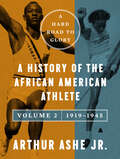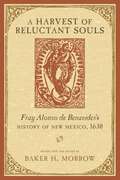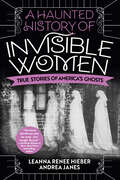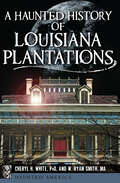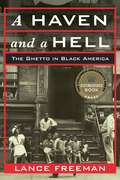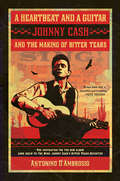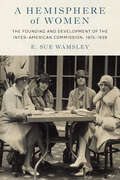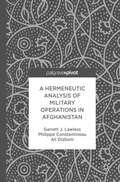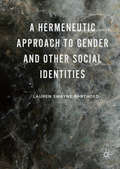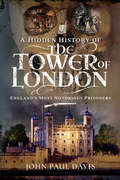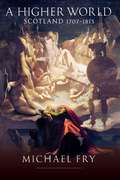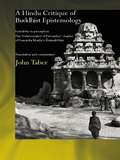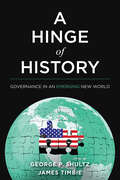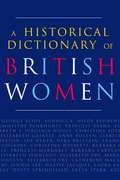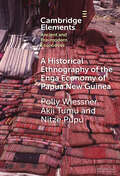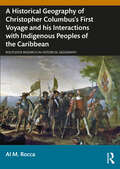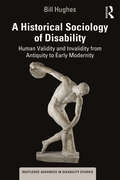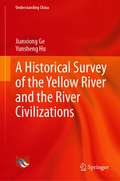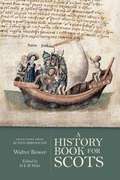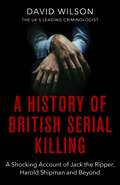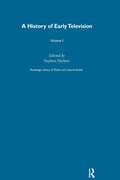- Table View
- List View
A Hard Road to Glory, Volume 2 (1919-1945): A History of the African-American Athlete
by Arthur Ashe Jr.“The most comprehensive reference source on African-American athletes yet compiled.”—San Francisco ChronicleWith a Foreword by Jeanne Moutoussamy-AsheAvailable once again for a new generation of readers, the second volume in Arthur Ashe’s epic trilogy that chronicles the remarkable legacy of Black athletes in the United States—a major addition to our understanding of American history and the fulfillment of this legendary sports star and global activist’s lifelong dream.When tennis great Arthur Ashe first published his A Hard Road to Glory trilogy, this ambitious project was the first of its kind, a milestone in the presentation of United States social history. A Hard Road to Glory Volume 2, carries on the little-known full story of Black athletes and their contributions to American sports and culture. Volume 2 covers America’s “Golden Age” of sports from the end of World War One to the end of World War Two, from to 1919–1945. It was a time when the feats of legends such as Babe Ruth, Red Grange, and Jack Dempsey shone brightly—and segregation reigned supreme. Racial restrictions led to the formation of independent Black organizations, which saw its own share of extraordinary stars. Meanwhile, a number of great Black athletes, including Jesse Owens and Joe Louis, became sports heroes admired by millions worldwide.Today, Black athletes and Black women in particular are receiving more visibility than ever for their unparalleled, world record-breaking excellence, their activism, and their leadership and vision. Serena Williams, Simone Biles, Sha’Carri Richardson, and Naomi Osaka are consistently elevating athletics and are reshaping the way we think about sports, excellence, society, and history.Arthur Ashe paved the way for them all; A Hard Road to Glory is fundamental to our understanding of Black athletes and our nation’s past, present, and future. Now more than ever, this collection is one of this amazing icon’s greatest legacies—a treasure to be celebrated by readers today and those to come.
A Harvest of Reluctant Souls: Fray Alonso de Benavides's History of New Mexico, 1630
by Baker H. MorrowThe most thorough account ever written of southwestern life in the early seventeenth century, this engaging book was first published in 1630 as an official report to the king of Spain by Fray Alonso de Benavides, a Portuguese Franciscan who was the third head of the mission churches of New Mexico. In 1625, Father Benavides and his party traveled north from Mexico City to New Mexico, a strange land of frozen rivers, Indian citadels, and mines full of silver and garnets. Benavides and his Franciscan brothers built schools, erected churches, engineered peace treaties, and were said to perform miracles.Benavides&’s riveting exploration narrative provides portraits of the Pueblo Indians, the Apaches, and the Navajos at a time of fundamental change. It also gives us the first full picture of European colonial life in the southern Rockies, the southwestern deserts, and the Great Plains, along with an account of mission architecture and mission life and a unique evocation of faith in the wilderness.
A Haunted History of Invisible Women: True Stories of America's Ghosts
by Leanna Renee Hieber Andrea Janes"Deliciously eerie.&” —Leslie Rule, Bestselling AuthorFrom the notorious Lizzie Borden to the innumerable, haunted rooms of Sarah Winchester's mysterious mansion this offbeat, insightful, first-ever book of its kind from the brilliant guides behind &“Boroughs of the Dead,&” featured on NPR.org, The New York Times, and Jezebel, explores the history behind America&’s female ghosts, the stereotypes, myths, and paranormal tales that swirl around them, what their stories reveal about us—and why they haunt us . . . Sorrowful widows, vengeful jezebels, innocent maidens, wronged lovers, former slaves, even the occasional axe-murderess—America&’s female ghosts differ widely in background, class, and circumstance. Yet one thing unites them: their ability to instill fascination and fear, long after their deaths. Here are the full stories behind some of the best-known among them, as well as the lesser-known—though no less powerful . . . Tales whispered in darkness often divulge more about the teller than the subject. America&’s most famous female ghosts, from &‘Mrs. Spencer&’ who haunted Joan Rivers&’ New York apartment to Bridget Bishop, the first person executed during the Salem witchcraft trials, mirror each era&’s fears and prejudices. Yet through urban legends and campfire stories, even ghosts like the nameless hard-working women lost in the infamous Triangle Shirtwaist Factory fire —achieve a measure of power and agency in death, in ways unavailable to them as living women. Riveting for skeptics and believers alike, with humor, curiosity, and expertise, A Haunted History of Invisible Women offers a unique lens on the significant role these ghostly legends play both within the spook-seeking corners of our minds and in the consciousness of a nation. Afterword by Bram Stoker Award-winning author Linda D. Addison&“An absolute must-buy for the spooky people of the world . . . utterly brilliant.&” —Mallory O'Meara, bestselling author of The Lady from the Black Lagoon and Girly Drinks&“If this book doesn&’t leave with you a sense of wonder and a healthy dose of goosebumps, check your pulse—you may already be among the spirits.&” —Marc Hartzman, author of Chasing Ghosts: A Tour of Our Fascination with Spirits and the Supernatural
A Haunted History of Louisiana Plantations (Haunted America)
by Cheryl H. White W. Ryan SmithStories of ghosts and strange happenings at these historic Southern homes—with photos included. Louisiana plantations evoke images of grandeur and elegance, but beyond the facade of stately homes are stories of hope and subjugation, tragedy and suffering, shame and perseverance and war and conquest. After sixteen workers axed most of the Houmas House&’s ancient oak trees, referred to as &“the Gentlemen,&” eight of the surviving trees eerily twisted overnight in grief over the losses wrought by a great Mississippi River flood. An illegal duel to reclaim lost honor left the grounds of Natchez&’s Cherokee Plantation bloodstained, but the victim&’s spirit may still wander there today. A mutilated slave girl named Chloe still haunts the halls of the Myrtles Plantation in St. Francisville. In this book, Cheryl H. White and W. Ryan Smith reveal the dark history, folklore, and lasting human cost of Louisiana plantation life.
A Haven and a Hell: The Ghetto in Black America
by Lance FreemanThe black ghetto is thought of as a place of urban decay and social disarray. Like the historical ghetto of Venice, it is perceived as a space of confinement, one imposed on black America by whites. It is the home of a marginalized underclass and a sign of the depth of American segregation. Yet while black urban neighborhoods have suffered from institutional racism and economic neglect, they have also been places of refuge and community.In A Haven and a Hell, Lance Freeman examines how the ghetto shaped black America and black America shaped the ghetto. Freeman traces the evolving role of predominantly black neighborhoods in northern cities from the late nineteenth century through the present day. At times, the ghetto promised the freedom to build black social institutions and political power. At others, it suppressed and further stigmatized African Americans. Freeman reveals the forces that caused the ghetto’s role as haven or hell to wax and wane, spanning the Great Migration, mid-century opportunities, the eruptions of the sixties, the challenges of the seventies and eighties, and present-day issues of mass incarceration, the subprime crisis, and gentrification. Offering timely planning and policy recommendations based in this history, A Haven and a Hell provides a powerful new understanding of urban black communities at a time when the future of many inner-city neighborhoods appears uncertain.
A Heartbeat and a Guitar: Johnny Cash and the Making of Bitter Tears
by Antonino D'AmbrosioA Heartbeat and a Guitar tells of the collaboration of two distinct yet connected musicians-iconoclast Johnny Cash and pioneering folk artist Peter La Farge-and the album they created, Bitter Tears: Ballads of the American Indian. It also tells of the unique personal, political, and cultural struggles that informed this album, one that has influenced the likes of Bruce Springsteen and Bob Dylan. D’Ambrosio has interviewed dozens of Cash’s and La Farge’s friends, family, and collaborators, including surviving members of his band, his producers, and Pete Seeger and Kris Kristofferson, creating a dramatic picture of both an era of radical protest and the making of one of the most controversial and enduring works of political pop art of the 1960s.
A Hemisphere of Women: The Founding and Development of the Inter-American Commission, 1915–1939
by E. Sue WamsleyThough the first decades of the twentieth century witnessed extensive U.S. intervention in Latin American affairs, the United States started to back away from overtly flexing its military muscle to gain power and control, instead using a type of &“soft power&” more in tune with the spirit of cooperation and collaboration. This new policy, often viewed as female attributes of Pan Americanism, opened the door for women to gain a foothold on the inter-American stage. In the late nineteenth and early twentieth centuries, these Pan American women&’s movements emerged with the founding of a variety of international organizations that began a worldwide campaign to improve women&’s lives. In A Hemisphere of Women E. Sue Wamsley analyzes the history of the Inter-American Commission of Women: the first all-female, government-affiliated body to deal specifically with women&’s civil and political rights in a transnational arena. She examines how women who had semi-official government roles worked within a neocolonial, male-dominated diplomatic setting to bring about change. U.S. women assumed that they would be the &“natural&” leaders, stereotyping their Latin American colleagues as unsophisticated and inexperienced. Party members quickly learned, however, that they had underestimated their Latin American sisters, who also had ideas about women&’s rights and how the campaign should be run. Utilizing the policy of &“soft power,&” the women, with the help of Latin American officials, managed to work around cultural differences and define common goals rooted in the advancement of women&’s civil and political rights, giving hemispheric women a recognized position in shaping transnational gender law. Wamsley&’s innovative analysis at once addresses a void in scholarship and interweaves the history of Pan Americanism, foreign relations, and imperialism with that of women.
A Hermeneutic Analysis of Military Operations in Afghanistan
by Garrett J. Lawless Philippe Constantineau Ali DizboniThis book introduces the field of hermeneutics through a critique of military operations in Afghanistan. Following a brief survey of modern political history of the country, the authors examine the link between cultural factors and the inefficiency of nation-building operations. Additionally, the project discusses contending academic approaches to culture, and identifies shortcomings in their theoretical propositions for military operations in failed states. Ultimately, this volume contextualizes the evolution of hermeneutical thinking and the benefits it provides in assessing the transformation of culture through military intervention.
A Hermeneutic Approach to Gender and Other Social Identities
by Lauren Swayne BartholdThis book draws on the hermeneutics of Hans-Georg Gadamer to inform a feminist perspective of social identities. Lauren Swayne Barthold moves beyond answers that either defend the objective nature of identities or dismiss their significance altogether. Building on the work of both hermeneutic and non-hermeneutic feminist theorists of identity, she asserts the relevance of concepts like horizon, coherence, dialogue, play, application, and festival for developing a theory of identity. This volume argues that as intersubjective interpretations, social identities are vital ways of fostering meaning and connection with others. Barthold also demonstrates how a hermeneutic approach to social identities can provide critiques of and resistance to identity-based oppression.
A Hidden History of the Tower of London: England's Most Notorious Prisoners
by John Paul Davis“With these incredible and often heartbreaking stories, John Paul Davis clearly demonstrates how the fortress acquired its sinister reputation.” —History . . . the Interesting Bits!Famed as the ultimate penalty for traitors, heretics and royalty alike, being sent to the Tower is known to have been experienced by no less than 8,000 unfortunate souls. Many of those who were imprisoned in the Tower never returned to civilization and those who did, often did so without their head! It is hardly surprising that the Tower has earned itself a reputation among the most infamous buildings on the planet.Beginning with the early tales surrounding its creation, this book investigates the private life of an English icon. Concentrating on the Tower’s developing role throughout the centuries, not in terms of its physical expansion into a site of unique architectural majesty or many purposes but through the eyes of those who experienced its darker side, it pieces together the, often seldom-told, human story and how the fates of many of those who stayed within its walls contributed to its lasting effect on England’s—and later the UK’s—destiny. From ruthless traitors to unjustly killed Jesuits, vanished treasures to disappeared princes and jaded wives to star-crossed lovers, this book provides a raw and at times unsettling insight into its unsolved mysteries and the lot of its unfortunate victims, thus explaining how this once typical castle came to be the place we will always remember as THE TOWER.“The building is as imposing now as it ever was, and the author’s complete and thorough knowledge is imparted in grand style.” —Books Monthly
A Hidden History of the Tower of London: England's Most Notorious Prisoners
by John Paul Davis“With these incredible and often heartbreaking stories, John Paul Davis clearly demonstrates how the fortress acquired its sinister reputation.” —History . . . the Interesting Bits!Famed as the ultimate penalty for traitors, heretics and royalty alike, being sent to the Tower is known to have been experienced by no less than 8,000 unfortunate souls. Many of those who were imprisoned in the Tower never returned to civilization and those who did, often did so without their head! It is hardly surprising that the Tower has earned itself a reputation among the most infamous buildings on the planet.Beginning with the early tales surrounding its creation, this book investigates the private life of an English icon. Concentrating on the Tower’s developing role throughout the centuries, not in terms of its physical expansion into a site of unique architectural majesty or many purposes but through the eyes of those who experienced its darker side, it pieces together the, often seldom-told, human story and how the fates of many of those who stayed within its walls contributed to its lasting effect on England’s—and later the UK’s—destiny. From ruthless traitors to unjustly killed Jesuits, vanished treasures to disappeared princes and jaded wives to star-crossed lovers, this book provides a raw and at times unsettling insight into its unsolved mysteries and the lot of its unfortunate victims, thus explaining how this once typical castle came to be the place we will always remember as THE TOWER.“The building is as imposing now as it ever was, and the author’s complete and thorough knowledge is imparted in grand style.” —Books Monthly
A Hidden Life: A Memoir of August 1969
by Johanna ReissIn 1969, Reiss made the trip to Holland to chronicle the two years, seven months, and one day she had spent hiding from the Nazis. Subtle and disturbing, the book is a powerful consideration of memory, violence, and loss, told in a stunning and sparse narrative style.
A Higher World: Scotland 1707–1815
by Michael Fry&“Engaging and very readable . . . an essential read for those wanting to get under the skin of modern Scottish history&” from the author of Glasgow (Scottish Field). Michael Fry here applies his uniquely wide-ranging procedures of Scottish historical analysis to the eighteenth century, which gave this small nation its one era of truly global significance. He adds: &“Never again was it to be so exemplary: unless, perhaps, in the twenty-first century.&” In his journey from the Union of 1707 to its centenary and beyond, Fry takes in vivid scenes from all over the country, ranges up and down the social scale from peeresses to prostitutes, from lairds to lunatics, and covers every major aspect of national life from agriculture to philosophy. Most other Scottish histories published in recent times concentrate on social and economic history, but Fry insists that any true understanding of the nation, in the past as in the present, needs to pay at least as much attention to politics and culture. The social history and the economic history show us how Scotland was integrated into Britain. The political history and the cultural history show us why the integration was never complete. In this book readers will see both sides surveyed. In that way they will come also to understand how the nation&’s rebirth in our own day remained possible. &“Has the usual Fry merits of being elegantly written and the product of an incisive and original mind.&” —The Herald &“Ambitious and well produced.&” —The Scotsman
A Hindu Critique of Buddhist Epistemology: Kumarila on Perception: The 'Determination of Perception' Chapter of Kumarila Bhatta's <I>Slokavarttika </I>- Translation and Commentary (Routledge Hindu Studies Series)
by John TaberThis is a translation of the chapter on perception of Kumarilabhatta's magnum opus, the Slokavarttika, one of the central texts of the Hindu response to the criticism of the logical-epistemological school of Buddhist thought. In an extensive commentary, the author explains the course of the argument from verse to verse and alludes to other theories of classical Indian philosophy and other technical matters. Notes to the translation and commentary go further into the historical and philosophical background of Kumarila's ideas. The book provides an introduction to the history and the development of Indian epistemology, a synopsis of Kumarila's work and an analysis of its argument.
A Hinge of History: Governance in an Emerging New World
by George P. Shultz James TimbieThe world is at an inflection point. Advancing technologies are creating new opportunities and challenges. Great demographic changes are occurring rapidly, with significant consequences. Governance everywhere is in disarray. A new world is emerging.These are some of the key insights to emerge from a series of interdisciplinary roundtables and global expert contributions hosted by the Hoover Institution. In these pages, George P. Shultz and James Timbie examine a range of issues shaping our present and future, region by region.Concrete proposals address migration, reversing the decline of K–12 education, updating the social safety net, maintaining economic productivity, protecting our democratic processes, improving national security, and more. Meeting these transformational challenges will require international cooperation, constructive engagement, and strong governance. The United States is well positioned to ride this wave of change—and lead other nations in doing the same.
A Historical Dictionary of British Women
by Cathy HartleyThis reference book, containing the biographies of more than 1,100 notable British women from Boudicca to Barbara Castle, is an absorbing record of female achievement spanning some 2,000 years of British life.Most of the lives included are those of women whose work took them in some way before the public and who therefore played a direct and important role in broadening the horizons of women. Also included are women who influenced events in a more indirect way: the wives of kings and politicians, mistresses, ladies in waiting and society hostesses.Originally published as The Europa Biographical Dictionary of British Women, this newly re-worked edition includes key figures who have died in the last 20 years, such as The Queen Mother, Baroness Ryder of Warsaw, Elizabeth Jennings and Christina Foyle.
A Historical Ethnography of the Enga Economy of Papua New Guinea (Elements in Ancient and Pre-modern Economies)
by Polly Wiessner Akii Tumu Nitze PupuThe question addressed in this Element is: What happens to a society when, in the absence of influence from foreign populations, constraints are released by a new crop making possible significant surplus production? We will draw on the historical traditions of 110 tribes of the Enga of Papua New Guinea recorded over a decade to document the changes that occurred in response to the potential for surplus production after the arrival of the sweet potato some 350 years prior to contact with Europeans. Economic change alone does not restructure a society nor build the social and political scaffolding for new institutions. In response to rapid change, the Enga drew on rituals that altered norms and values and resolved cultural contradictions that inhibited cooperation to bring about complexity rather than chaos. The end result was the development of one of the largest known ceremonial exchange systems prior to state formation.
A Historical Geography of Christopher Columbus’s First Voyage and his Interactions with Indigenous Peoples of the Caribbean (Routledge Research in Historical Geography)
by Al M. RoccaThis book offers a unique account of Christopher Columbus’s first voyage, the most consequential voyage in world history. It provides a detailed day-by-day account of the explorer’s travels and activities, richly illustrated with thematic maps.This work expands our understanding of Columbus’s first voyage by mapping his sea and land experiences, offering both a historical and geographical exploration of his first voyage. Traveling chronologically through events, the reader builds a spatial insight into Columbus’s perspectives that confused and confirmed his pre-existing notions of Asia and the Indies, driving him onward in search of new geographic evidence. Drawing from a diverse range of primary and secondary historical resources, this book is beautifully adorned with illustrations that facilitate an in-depth exploration of the connections between the places Columbus encountered and his subsequent social interactions with Indigenous people. This methodology allows the reader to better understand Columbus’s actions as he analyzes new geographic realities with pre-existing notions of the “Indies.” Attention is given to Columbian primary sources which analyze how those materials have been used to create a narrative by historians. Readers will learn about the social and political structures of the Lucayan, Taíno, and Carib peoples, achieving a deeper understanding of those pre-Columbian cultures at the time of contact.The book will appeal to students and researchers in the disciplines of history, geography, and anthropology, and the general reader interested in Colombus.
A Historical Sociology of Disability: Human Validity and Invalidity from Antiquity to Early Modernity (Routledge Advances in Disability Studies)
by Bill HughesCovering the period from Antiquity to Early Modernity, A Historical Sociology of Disability argues that disabled people have been treated in Western society as good to mistreat and – with the rise of Christianity – good to be good to. It examines the place and role of disabled people in the moral economy of the successive cultures that have constituted ‘Western civilisation’. This book is the story of disability as it is imagined and re-imagined through the cultural lens of ableism. It is a story of invalidation; of the material habituations of culture and moral sentiment that paint pictures of disability as ‘what not to be’. The author examines the forces of moral regulation that fall violently in behind the dehumanising, ontological fait accompli of disability invalidation, and explores the ways in which the normate community conceived of, narrated and acted in relation to disability. A Historical Sociology of Disability will be of interest to all scholars, students and activists working in the field of Disability Studies, as well as sociology, education, philosophy, theology and history. It will appeal to anyone who is interested in the past, present and future of the ‘last civil rights movement’.
A Historical Survey of the Yellow River and the River Civilizations (Understanding China)
by Jianxiong Ge Yunsheng HuThis book explores the relationship between rivers and ethics in China, with a particular focus on the health of the Yellow River and China’s sustainable development. Though the book falls into the category of East Asian History, it is an interdisciplinary academic work that addresses not only history, but also culture, human geography and physical geography.It traces the changes in the Yellow River over time and examines the origin and developmental course of Chinese civilization, which has always been closely intertwined with the Yellow River. It also draws comparisons between the Yellow River and the Yangtze, Nile, Tigris, Euphrates and Indus rivers to provide insights into how they have contributed to civilizations. At the same time, it discusses the lessons learned from people’s taming the Yellow River.Most significantly, the book explores the relationship between humans and the environment from an ethical standpoint, making it an urgent reminder of the crucial role that human activities play in environmental issues concerning the Yellow River so as to achieve a sustainable development for China’s “mother river.” The intended audience includes academic readers researching East Asian and Chinese history & culture, geography, human geography, historical geography, the environment, river civilizations, etc., as well as history and geography lovers and members of the general public who are interested in the Yellow River and the civilization that has evolved around it.
A Historiography of the Modern Social Sciences
by Roger E. Backhouse Philippe FontaineA Historiography of the Modern Social Sciences includes essays on the ways in which the histories of psychology, anthropology, sociology, economics, history and political science have been written since the Second World War. Bringing together chapters written by the leading historians of each discipline, the book establishes significant parallels and contrasts and makes the case for a comparative interdisciplinary historiography. This comparative approach helps explain historiographical developments on the basis of factors specific to individual disciplines and the social, political, and intellectual developments that go beyond individual disciplines. All historians, including historians of the different social sciences, encounter literatures with which they are not familiar. This book will provide a broader understanding of the different ways in which the history of the social sciences, and by extension intellectual history, is written.
A History Book for Scots: Selections from the Scotichronicon
by Walter BowerRiveting selections from a 15-century account of Scottish history, one of Scotland&’s national treasures. Writing on a small island in the Firth of Forth in the 1440s, Walter Bower set out to tell the whole story of the Scottish nation in a single huge book, the Scotichronicon— &“a history book for Scots.&” It begins with the mythical voyage of Scota, the Pharaoh&’s daughter, from Egypt with the Stone of Destiny. The land that her sons discovered in the Western Ocean was named after her: Scotland. It then describes the turbulent events that followed, among them the wars of the Scots and the Picts (begun by a quarrel over a dog); the poisoning of King Fergus by his wife; Macbeth&’s usurpation and uneasy reign; the good deeds of Margaret, queen and saint; Bruce&’s murder of the Red Comyn; the founding of Scotland&’s first university at St. Andrews; the &“Burnt Candlemas;&” and the endless troubles between Scotland and England. Weaving in and out of the events of Bower&’s factual history are other subjects that fascinated him: harrowing visions of hell and purgatory, extraordinary miracles; the exploits of knights and beggars, merchants and monks; the ravages of flood and fire; the terrors of the plague; and the answers to such puzzling questions as what makes a good king, and why Englishmen have tails. This monumental work, in which the original Latin text appears side by side with a translation in modern English, was completed in 1998. It includes an introduction and notes that guide the reader through the complexities of Bower&’s history and its background.
A History Of British Serial Killing: The Shocking Account of Jack the Ripper, Harold Shipman and Beyond
by David WilsonBE THE FIRST TO READ DAVID WILSON'S NEW TRUE CRIME BOOK "A PLOT TO KILL" BY PRE-ORDERING NOW Expanded and updated, this is the definitive history of British serial killing 1888-2020 - by the UK's leading criminologist, David WilsonIn this fascinating and informative book, Professor David Wilson tells the stories of Britain's serial killers from Jack the Ripper to the extraordinary Suffolk Murders case. David Wilson has worked as a Prison Governor and as a profiler, and has been described as the UK's leading expert on serial killers. His work has led him to meet several of the UK's deadliest killers, and build up fascinating insights into what makes a serial killer - and who they are most likely to target. A vivid narrative history and a call for prison and social reform, Professor Wilson's new book is a powerful and gripping investigation of Britain's serial murderers.
A History Of British Serial Killing: The Shocking Account of Jack the Ripper, Harold Shipman and Beyond (The Books of Babel)
by David WilsonBE THE FIRST TO READ DAVID WILSON'S NEW TRUE CRIME BOOK "A PLOT TO KILL" BY PRE-ORDERING NOW Expanded and updated, this is the definitive history of British serial killing 1888-2020 - by the UK's leading criminologist, David WilsonIn this fascinating and informative book, Professor David Wilson tells the stories of Britain's serial killers from Jack the Ripper to the extraordinary Suffolk Murders case. David Wilson has worked as a Prison Governor and as a profiler, and has been described as the UK's leading expert on serial killers. His work has led him to meet several of the UK's deadliest killers, and build up fascinating insights into what makes a serial killer - and who they are most likely to target. A vivid narrative history and a call for prison and social reform, Professor Wilson's new book is a powerful and gripping investigation of Britain's serial murderers.
A History Of Early Television Vol 1
by Stephen HerbertIn the 21st Century, broadcast television is an established part of the lives of many millions of people all over the world, bringing information and entertainment directly into our homes. The pieces in this volume date from 1879 to 1934 and consist of a selection of books, articles and news items relating to the first developmental period of television, before it became the ubiquitous medium that we know today. The selection is English language material only.
